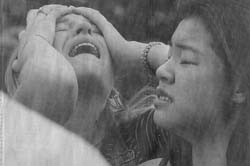


Lessons in Law: Is a student writer paying for our post-Columbine hysteria?
January 10, 2001
|
"Twister" is the title of a story told by a 15 year-old boy to his creative writing class. It is the tale of an unnamed boy who had been "harassed and tortured all his life until he was at the brink of insanity and sanity," and , having discovered that life was pain, "retreated from the world." It describes his bad mood on a particularly bad day and alludes to dark thoughts that no one could see. It ends abruptly: "he went happily along, waiting for the right moment. He decided to detonate at 12:12 p.m. exactly. Everyone would be having lunch and having fun." Because the author was a bit different
and had himself probably been bullied, his classmates immediately
assumed the story was autobiographical. And since the young
writer chose not to bring the story to a "blood and gore"
climax, everyone was left wondering as to what would happen
next. Rumours began to fly around the school that he had a plan
and that "the 13 packages of C-4explosives and the detonator"
were for real. With the gruesome images of mass killings
in schools still fresh in our minds, it is understandable that
authorities at Tagwi Secondary in Avonmore, near Cornwall, would
become concerned about the rumours. It makes sense they would
question the boy. When he denied having any plans and said the
story was nothing more than his drama assignment, one might
wonder why they suspended him. However, in the wake of a panic
among students and their parents, that may have been necessary. But, when two weeks later police raided
the family home and, after searching the house and finding no
evidence of planned violence, they handcuffed and arrested the
boy, I was left thinking that "Columbine panic" had
gone too far. When a boy is charged with uttering death
threats and spends the Christmas holidays in a detention center
because he wrote a story in which the central character plans
to kill fictional students in a fictional school, what does
this mean? Is this boy truly dangerous? Is he guilty of some
gruesome intent? Did he really threaten to kill his peers? Is
his story "a twisted cry for help," as many of those
rallying around him now suggest?” Or was it just an effective
piece of fiction? I asked the well-known Canadian author
and creative writing teacher, Sharon Butala to read his story.
She was not shocked by its content. "Teenagers," she notes, "often
write about death, suicide and killing. It is on their minds,
in the papers, in published fiction and in the movies. It's
an idea in their mind not something that they are necessarily
planning to do." Creative writing courses are intended to
encourage students to write from their own experience, expressing
moods and feelings, giving their story a twist and doing it
dramatically to catch the reader's interest. From what we know
of this young boy, that's what he did. Reportedly, he had often
been picked on by other students, so he could identify with
his protagonist's feelings of anger and despair. And probably,
like any good writer, he researched the topic to get the details
right. And evidently, he wrote it in a persuasive fashion that
caught his audience's attention. "If I knew nothing about this boy
and just read the piece," Butala says, "I'd have thought
it a pretty good piece of writing for an average student in
Grade 11." Not a bad comment from a successful author to
a budding writer. However, instead of being encouraged, he
is being treated as a dangerous criminal. Though prosecutors
have not made public any evidence save the essay - no list of
targets, no plan, no explosives, no weapons - the boy stands
charged. All of this is on the assumption that he
is writing about himself. But no one charges Stephen King after
reading one of his horror stories, dripping in blood and gore.
And no one accuses Booker Prize winner Pat Barker, whose novel,
Another World, describes a child who almost kills his little
brother because he is bullied in the community he lives in and
nobody understands just how bad it is, of having a criminal
mind. "Nobody has the right," Butala
asserts, "o assume that this young man is talking about
himself if he wrote this in a creative writing class." But, of course, everybody does. For decades
psychiatrists have been writing psycho-biographies of famous
authors, suggesting to us that by analysing their works we can
detect their psychopathology. With their encouragement and the
musings of literary reviewers, we have come to believe that
we can know a writer by his or her fiction. We assume that we
can read intent and predict crime or detect a cry for help. In the moral panic to prevent another Columbine
or Taber, have the gates have been opened for people to be charged
for what they might do, for their thoughts and fantasies? What
if, instead of being a dangerous threat, an emerging criminal,
or a psychological casualty, this boy is a budding author? Creative
writing is his favourite course. He aspires to be a writer and,
as evidenced by the reaction to this story, he may have some
talent. The assistant Crown attorney wants to keep
him locked up because he "dwells on death and violence"
and betrays feelings which are "disturbing psychologically."
With foreboding, she asks: "What's he going to do for an
encore?" Perhaps he'll write a story
about a boy who is arrested for a thought crime, and leave the
ending open. |
tanadineen.com
@ Dr.Tana
Dineen
1998-2003
by
Dr. Tana Dineen, special columnist,
The Ottawa Citizen
